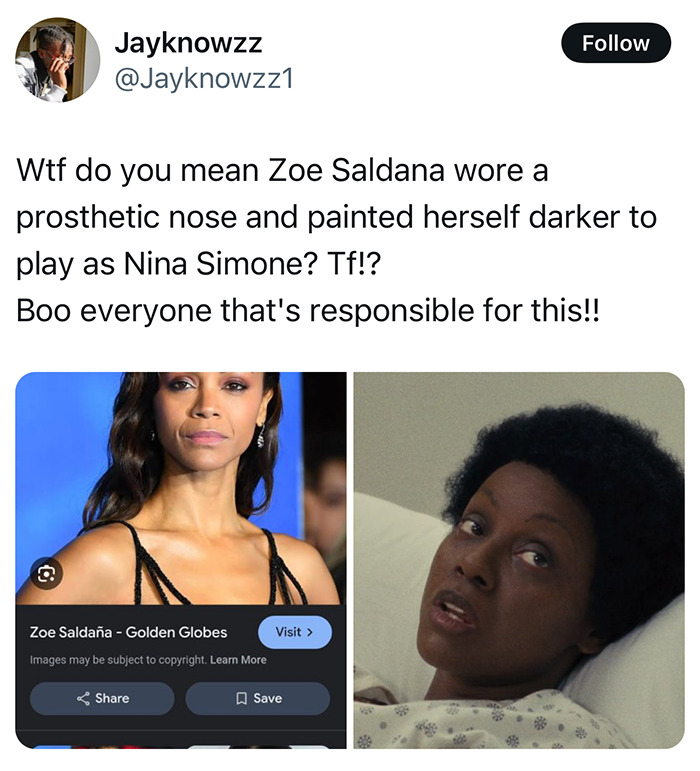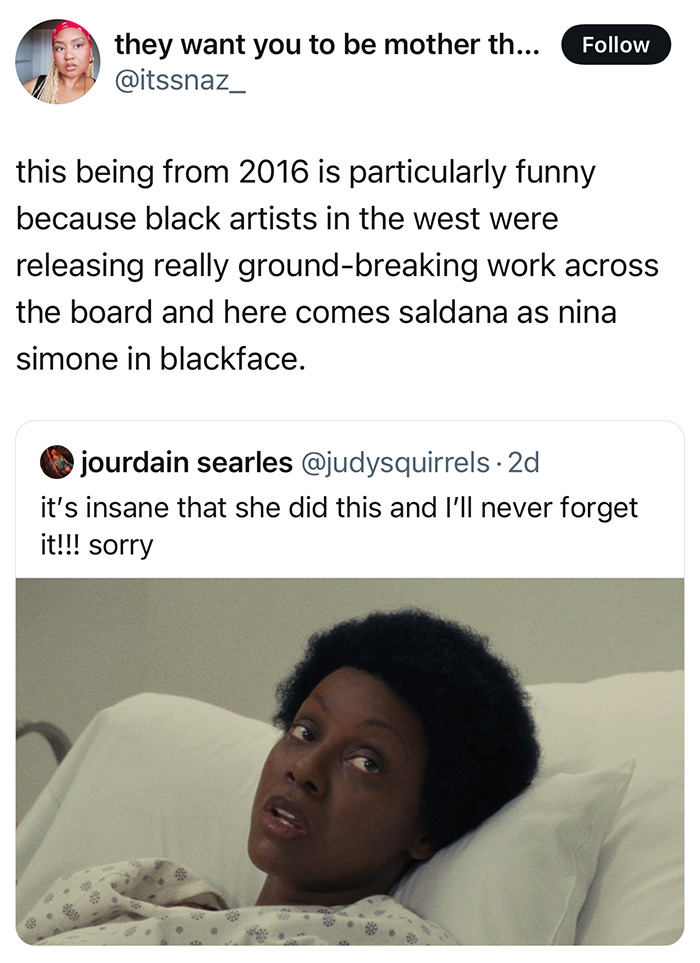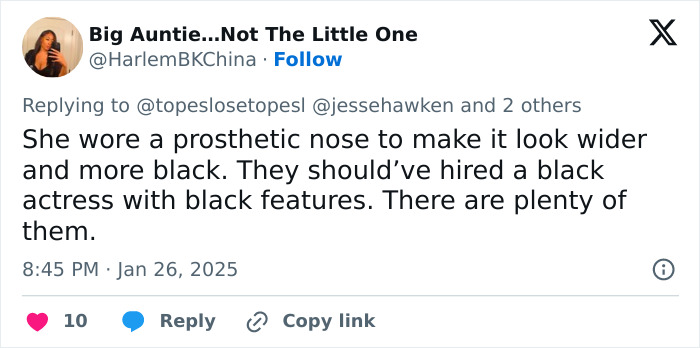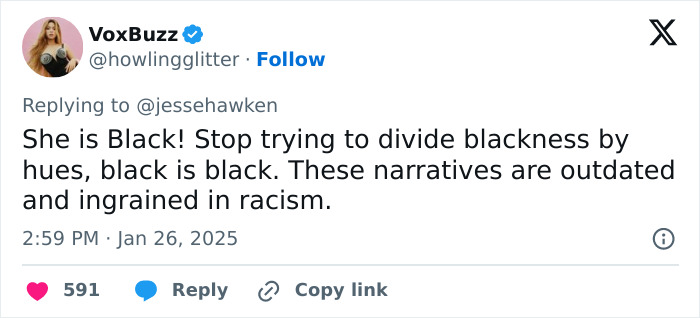Zoe Saldaña is being slammed for performing in “blackface” in the 2016 Nina Simone biopic. The controversy surrounding her portrayal of the iconic jazz musician has intensified in light of Saldaña’s first Oscar nomination.
The 46-year-old is nominated for Best Supporting Actress for her role as criminal defense lawyer Rita Mora Castro in the musical Emilia Pérez.
The French film is leading the Oscar nominations with 13 nods, followed by Wicked and The Brutalist with 10 each.
Zoe Saldaña has come under fire again for doing “blackface” to portray Nina Simone in the 2016 biopic

Image credits: Kevin Mazur/Getty Images
In 2016, Saldaña faced backlash after she reportedly wore dark makeup and a prosthetic nose for the biopic Nina.
“I can’t believe she ever worked again after doing this and how hard she defended it at the time,” one user wrote.
“It’s so crazy to do all this, rather than just hiring a dark skin actress??? It was 2016, it’s not like there was a shortage of relevant dark skin actresses,” another person said.
A separate user added: “It’s insane that she did this and I’ll never forget it!!! Sorry.”

“Today I learned that Zoe Saldaña played Nina Simone in a movie where she did it in blackface, this was only in 2016!” commented someone else.
Saldaña’s portrayal was even criticized by Simone’s family. In 2012, when she was announced as the leading actress, the singer’s daughter Lisa Simone Kelly said, “Appearance-wise, this is not the best choice.”
Instead, Lisa said she preferred actresses with “beautiful, luscious lips and wide noses” to portray her mother.
She said she enjoyed Saldaña’s films but felt stars such as Kimberly Elise or Viola Davis would have been better options, as they are “women of color who know their craft.”
The controversy reignited after Saldaña earned her first Oscar nomination for Emilia Pérez

“I also have no problem introducing someone we’ve never heard of before who can play my mother,” the Broadway actress added.
When the trailer was released in 2016, the official social media account run by Simone’s estate told the actress: “Cool story but please take Nina’s name out your mouth. For the rest of your life.”
Saldaña, who is of Dominican and Puerto Rican descent, defended her work at the time, stating, “If Elizabeth Taylor can be Cleopatra, I can be Nina.
“It doesn’t matter how much backlash I will get for it. I will honor and respect my black community because that’s who I am.”
The 46-year-old reportedly wore dark makeup and a prosthetic nose to play the jazz musician


“I don’t care who tells me that I am not this and I am not that. I know who I am and I know what Nina Simone means to me,” she highlighted in an interview with HipHollywood.
“So that is my truth and that set me free.”
Written and directed by Cynthia Mort, the film focuses on Simone’s social activism and celebrated music career.
The biopic’s distributor, Robert L. Johnson, complained about the casting controversy in 2016, saying, “It’s unfortunate that African Americans are talking about this in a way that hearkens back to how we were treated when we were slaves.
“The slave masters separated light-skinned blacks from dark-skinned blacks, and some of that social DNA still exists today among many black people.”
Her portrayal was met with criticism, most notably from Simone’s family

Image credits: Prime Video
Johnson likened the debate surrounding Saldaña’s skin color to the infamous early 20th-century “brown paper bag” test, in which African Americans were turned away from black social institutions if their skin was darker than the bag’s color.
“That’s where some of this comes from, when you hear people saying that a light-skinned woman can’t play a dark-skinned woman when they’re both clearly of African descent.
“To say that if I’m gonna cast a movie, I’ve gotta hold a brown paper bag up to the actresses and say, ‘Oh sorry, you can’t play her.’ Who’s to decide when you’re black enough?”
Social media users recently criticized Saldaña for darkening her skin tone to portray Simone



The Avatar actress received support from other African American stars, including Queen Latifah and Paula Patton.
Despite her initial defense of her role, Saldaña apologized for playing Simone four years after the film’s release. “I thought back then that I had the permission because I was a black woman. And I am,” she began.
“But it was Nina Simone. And Nina had a life, and she had a journey that should have been, and should be, honored to the most specific detail because she was a specifically detailed individual.”
Though she initially defended the role, the actress later apologized, saying, “I should have done everything in my power to cast a black woman”


“I should have done everything in my power with the leverage that I had 10 years ago, which was a different leverage, but it was leverage nonetheless.
“I should have done everything in my power to cast a black woman to play an exceptionally perfect black woman.”
Her latest film, Emilia Pérez, has also faced criticism for not casting native Spanish speakers in all the leading roles, despite being set in Mexico. Additionally, some viewers took issue with the movie’s representation of the transgender community.
The film received four Golden Globe awards, including Best Supporting Actress for Saldaña.
The actress’ portrayal of Nina Simone continued to spark divided reactions



























